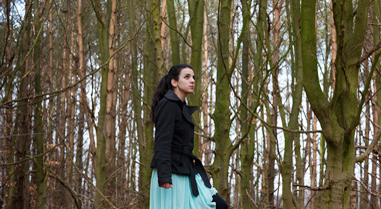Each time Elle (22) goes in search of the fun and cosiness of student flats, but each time she is disappointed. Or rejected. That suffocating ‘cliquing’ began in secondary school already. She doesn’t like to talk about it with her friends.
Secondary school wasn’t always easy for Elle. ‘In order to belong you had to join a sports club or some other kind of club. But I never felt comfortable with other people and I didn’t know how to belong. I had periods in which I cried terribly.’
After she left school, Elle travelled. First she spent three months in Spain and then another three months in Argentina and Australia. ‘That was all great fun. Nobody expects anything from you. After that I enrolled in social sciences.’
Sorority house
‘Just like everyone around me, I joined a student union, although I didn’t realise what I was getting myself into. I ended up in a kind of sorority house where they had a lot of rules. Things started going wrong after only a few months. I wanted to close the door to my room from time to time, but my housemates wouldn’t let me. I had to leave it ajar at all times, so that they could feel free to walk in. I was also told to show more enthusiasm regarding communal stuff. It’s not nice to hear that.’
Elle thinks it bothered her housemates that she stayed true to herself and didn’t want to be influenced. ‘Other girls could be told what to do: where to buy their clothes, which pub to go to and even how to sit, literally everything. But they didn’t manage that with me. It wasn’t a good start to my studies, because when ten girls tell you you’re no fun, it’s a blow to your self-confidence. You’re rejected by the group you wanted to be a part of.’
Elle left of her own accord.
Loss of face
‘I am a go-getter and I thought: I’m not going to be put off by stupid cows like that. So I moved into a student house for the second time. I needed the social interaction as well. I had few real friends at the time and it was important to me to have somewhere, after a long day of studying, to talk about my day. Of course, you can always phone someone, but I like the idea of not having to come home to an empty house.’
Her next student house, again with only girls, was a little more relaxed. But her second attempt ended in disappointment as well. ‘I became ill and then my housemates very bluntly said I couldn’t stay there anymore if I was ill. So after four months I was out on the street again, rejected by a group of girls once more. You lose face when you’re thrown out of a student house a second time. As I walked through the city, I kept thinking that everyone knew. That felt very suffocating.’
A little child
Her studies were deteriorating. ‘The increasing pressure made my eating habits worse. I would take sandwiches to school, but it was never enough for a whole day. In addition I had a bladder infection almost every fortnight, but I didn’t want to give in to that. I don’t like to make a fuss.
Eventually I broke down completely. During a study outing to Berlin, a friend of mine dragged me around for two days, because I couldn’t do anything for myself anymore. I took a train back home early, because all I could do was cry.
Elle moved back home with her parents for six months, to get back her strength. ‘I didn’t do anything at all during that period. I was like a little child, I slept with the door open and my mother tucked me in every night. I had hysterical crying fits. Any negative comments that were made, I took personally. I was also very fearful of the smallest of things. Every time I went up a staircase, or when I was on the back of someone’s bicycle, I was afraid I would fall off. In the end I was diagnosed with a burnout.
Cliquing
Elle thinks many of her problems lead back to her time at secondary school. ‘When I went to university, I ended up in the same situation, girl groups forming cliques. It all started up again in my student life.’ She never talks about this with her friends. ‘I do talk to strangers about this, you can just tell your story to them, but with friends you have to show your true feelings. I’ll never break down in tears with a friend. I’m an introvert.’ Elle has recently started her internship and she tries not to dwell too much on the past. But things aren’t going well now either. ‘I’m very tired again and don’t feel like doing anything. My living situation is still not ideal. I live with four people in a student house and I have a large room, which is reasonably quiet. So that’s fine. The only thing is that there is another girl living there with whom I don’t communicate well. I find that difficult.’ But Elle still doesn’t want to live alone. ‘I’m sure I would have a great time, but I am afraid that people will judge me for preferring to live alone and not being a sociable type of person. Many people around me are.’



 print version
print version